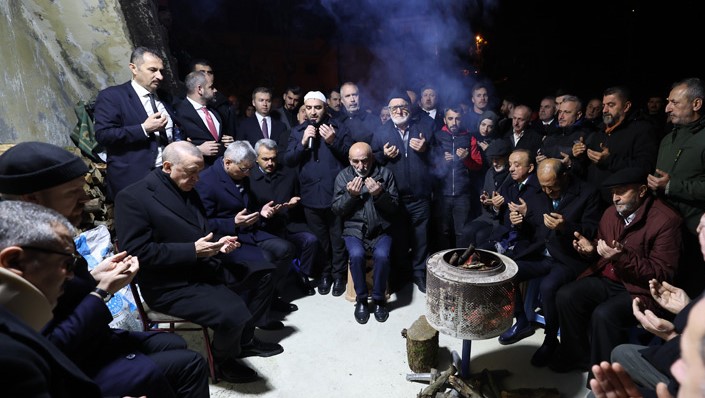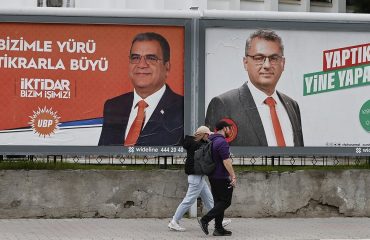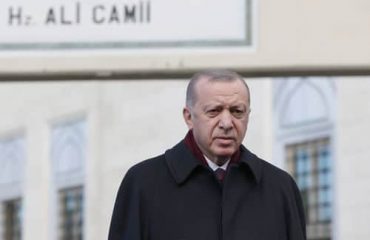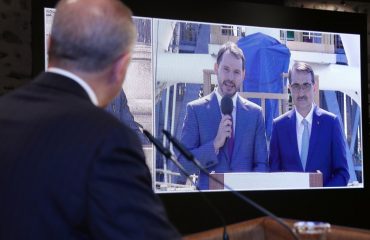

The President aims to clarify the government’s approach with his warning that if PKK “doesn’t bury their weapons, they will be buried.” Erdoğan is seen at his neighbor’s condolence ceremony in Güneysu district of Rize. (Photo: Presidency)
“Separatist terrorists will either bury their weapons immediately or be buried alongside them. There is no middle ground. The era of weapons, violence, and terrorism has come to an end.” President Tayyip Erdoğan didn’t utter these words for the first time at his ruling party AKP’s Provincial Congress in Samsun on January 4; he deliberately wants to keep repeating them.
However, the timing was significant in tempering the enthusiasm of second and third-tier political actors who had been buoyed by prospects of dialogue with the PKK – prospects brought by the DEM Party delegation that visited İmralı to meet with PKK’s founding leader Abdullah Öcalan, an initiative driven by Erdoğan’s ally, MHP leader Devlet Bahçeli.
Erdoğan effectively put in their place those politicians and political commentators from both government and opposition camps who were prematurely announcing PKK disarmament timetables, getting ahead of themselves before understanding the full picture.
What does Erdoğan want?
Erdoğan demands that the PKK “bury” their weapons “immediately.” Not a ceasefire, not a laying down of arms, but a burial of weapons – meaning the PKK must declare an end to its armed struggle dating back to 1978 and effectively dissolve the organization.
The alternative threat of being “buried” carries both literal and metaphorical weight: the target of this threat is no longer within Türkiye, but rather in Syria and Iraq where the PKK has built up its armed forces through cooperation with the US. All indicators suggest that Türkiye is preparing to deploy its full military might against PKK forces. The recent weeks of inspection activities by Defense Minister Yaşar Güler and force commanders at strategic military units along the Syrian, Iraqi, and Iranian borders should be interpreted in conjunction with Erdoğan’s latest statements.
It’s also telling that while Erdoğan reiterates his “bury weapons” ultimatum, it was announced that he would not personally meet with the DEM Party representatives who spoke with Öcalan in İmralı – Parliamentary Deputy Speaker Sırrı Süreyya Önder and party heavyweight Pervin Buldan. Instead, AKP Parliamentary Group Chairman Abdullah Güler would handle these meetings. Erdoğan is clearly unwilling to stake his personal involvement this time without first hearing the specific commitments he seeks from the PKK.
CHP’s position
CHP leader Özgür Özel seized upon this point in Sarıkamış on January 5, noting “We will assess with our colleagues how a party leader’s refusal to participate in these meetings might impact the process” – highlighting Erdoğan’s cautious approach and aligning with Özel’s own statements from the previous day.
When Erdoğan was speaking in Samsun on January 4, Özel had struck a measured tone in Ardahan, declaring “We will neither obstruct nor derail the process, but we won’t become participants in it either.”
This measured stance by CHP also serves to clearly differentiate them from the İYİ Party and Victory Party, both of which have explicitly declared their opposition to any new dialogue with the PKK.
Given that CHP has faced criticism over the past decade for its misjudgments regarding Syria policy, their current careful approach to this PKK dialogue process – which coincides with regime changes in Syria – is understandable.
The PKK’s position
The PKK’s actual demands remain unclear. We lack insight into PKK’s current stance on multiple fronts: Öcalan’s statements (what little has been made public), the DEM Party members’ comments, the MHP leader’s positions, or even the unauthorized statements from AKP members.
PKK is weighing several critical factors: HTS leader Ahmed el-Shara’s opposition to federation after assuming power in Syria, the implications of Donald Trump’s potential retention or withdrawal of forces in Syria after taking office on January 20th, Israel’s weakening of Iran’s influence across Palestine, Lebanon, and Syria, and most crucially, Türkiye’s preparations for a comprehensive military operation. It’s an intricate strategic calculation.
When DEM Party Co-Chair Tuncer Bakırhan mentioned on January 5th that the dialogue process with Öcalan must include changes to Türkiye’s Rojava policy, it suggested significant PKK pressure on the DEM leadership.
After the US Defense Department rejected claims about establishing a base in Kobani to prevent Turkish strikes against the PYD/YPG, Israeli Foreign Minister Gideon Saar reportedly assured SDF’s foreign relations representative Ilham Ahmed that “Israel would guarantee the protection of Kurdish rights.”
This sequence of events suggests Kandil is operating from a position of increasing vulnerability.
The Selahattin Demirtaş complication
Meanwhile, reports surfacing in news agencies about DEM Party’s planned meetings with Selahattin Demirtaş point to another layer of complexity.
Journalist Deniz Zeyrek shared a crucial behind-the-scenes insight. The DEM delegation, bolstered by Ahmet Türk’s presence, had intended to raise the Demirtaş issue during their meetings with Bahçeli. However, Bahçeli refused to even allow discussion of the topic – the “We won’t let you become president” stance remains firmly in place. (In my view, this same dynamic explains Osman Kavala’s continued imprisonment.)
Yet this political calculation faces a grassroots reality: just last evening, a Kurdish worker approached our group of journalists, and after discussing economic hardships, declared “We look to Selahattin Demirtaş” – a sentiment that clearly unsettles Öcalan, Kandil, and the People’s Alliance alike. It’s not just DEM Party members – a significant segment of the public believes Demirtaş has been treated unjustly (including by DEM itself) and wants to hear his perspective.
In his comprehensive analysis “Türkiye in the Solution Process: 2025” published in Diyarbakır Söz newspaper (recommended reading for those following these developments), Mesut Değer, a veteran figure in Kurdish politics, identified this very issue of “presidential politics” as one of the key factors in the collapse of the previous “process.”
The public’s perspective
Neither Erdoğan nor Bahçeli appear currently focused on the Demirtaş element, seemingly leaving that issue to DEM. Their immediate priority is securing either PKK’s announcement of ending armed struggle or, at minimum, DEM’s public break from PKK through such an announcement.
The vast majority of citizens desire an end to the climate of violence, a return to addressing real issues under secure conditions, and achieving prosperity with equitable distribution.
Undoubtedly, there are power centers both within and outside Türkiye that benefit from maintaining an atmosphere of violence and threat.
Therefore, rather than rushing forward with empty rhetoric about “paradigm shifts,” there needs to be clear public communication about what’s actually transpiring and what each party’s true objectives are.
If Erdoğan’s stark warning – “If they don’t bury their weapons, they’ll be buried” – doesn’t articulate the government’s position clearly enough, what would?
“Hun be xer Hatîn”: How three words signal Türkiye’s Kurdish policy shift


